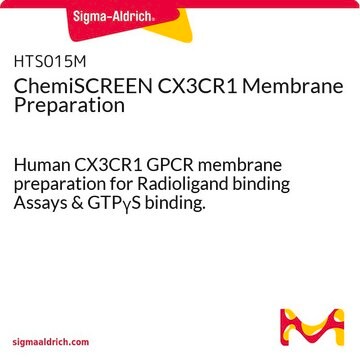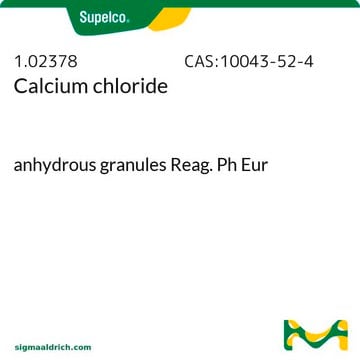03004
Abberior® STAR 512, maleimide
for STED application
Iniciar sesiónpara Ver la Fijación de precios por contrato y de la organización
About This Item
Código UNSPSC:
12352111
NACRES:
NA.32
Productos recomendados
Nivel de calidad
mol peso
Mw 861.7 g/mol
concentración
≥50% (degree of coupling)
solubilidad
DMF: 0.25 mg/mL, clear
fluorescencia
λex 512 nm; λem 530 nm±5 nm in PBS, pH 7.4
temp. de almacenamiento
−20°C
Descripción general
Absorption Maximum, λmax: 517 nm (MeOH),
511 nm (PBS, pH 7.4)
Extinction Coefficient, ε(λmax): 85,000 M-1cm-1 (PBS, pH 7.4)
Correction Factor, CF260 = ε260/εmax: 0.24 (PBS, pH 7.4)
Correction Factor, CF280 = ε280/εmax: 0.07 (PBS, pH 7.4)
Fluorescence Maximum, λfl: 533 nm (MeOH),
530 nm (PBS, pH 7.4)
Recommended STED Wavelength, λSTED: 590 −620 nm
Fluorescence Quantum Yield, η: 0.82 (PBS, pH 7.4)
Fluorescence Lifetime, τ: 4.1 ns (PBS, pH 7.4)
511 nm (PBS, pH 7.4)
Extinction Coefficient, ε(λmax): 85,000 M-1cm-1 (PBS, pH 7.4)
Correction Factor, CF260 = ε260/εmax: 0.24 (PBS, pH 7.4)
Correction Factor, CF280 = ε280/εmax: 0.07 (PBS, pH 7.4)
Fluorescence Maximum, λfl: 533 nm (MeOH),
530 nm (PBS, pH 7.4)
Recommended STED Wavelength, λSTED: 590 −620 nm
Fluorescence Quantum Yield, η: 0.82 (PBS, pH 7.4)
Fluorescence Lifetime, τ: 4.1 ns (PBS, pH 7.4)
Aplicación
Abberior® Star 512 labelled phosphoethanolamine lipid analogues were used for gated STED-FCS (stimulated emission depletion - fluorescence correlation spectroscopy) study.
Idoneidad
Designed and tested for fluorescent super-resolution microscopy
Otras notas
Información legal
abberior is a registered trademark of Abberior GmbH
Producto relacionado
Referencia del producto
Descripción
Precios
Código de clase de almacenamiento
11 - Combustible Solids
Clase de riesgo para el agua (WGK)
WGK 3
Punto de inflamabilidad (°F)
Not applicable
Punto de inflamabilidad (°C)
Not applicable
Elija entre una de las versiones más recientes:
Certificados de análisis (COA)
Lot/Batch Number
¿No ve la versión correcta?
Si necesita una versión concreta, puede buscar un certificado específico por el número de lote.
¿Ya tiene este producto?
Encuentre la documentación para los productos que ha comprado recientemente en la Biblioteca de documentos.
Mathias P Clausen et al.
Methods (San Diego, Calif.), 88, 67-75 (2015-07-01)
Recent years have seen the development of multiple technologies to investigate, with great spatial and temporal resolution, the dynamics of lipids in cellular and model membranes. One of these approaches is the combination of far-field super-resolution stimulated-emission-depletion (STED) microscopy with
S W Hell et al.
Optics letters, 19(11), 780-782 (1994-06-01)
We propose a new type of scanning fluorescence microscope capable of resolving 35 nm in the far field. We overcome the diffraction resolution limit by employing stimulated emission to inhibit the fluorescence process in the outer regions of the excitation
Marcus Dyba et al.
Nature biotechnology, 21(11), 1303-1304 (2003-10-21)
We report immunofluorescence imaging with a spatial resolution well beyond the diffraction limit. An axial resolution of approximately 50 nm, corresponding to 1/16 of the irradiation wavelength of 793 nm, is achieved by stimulated emission depletion through opposing lenses. We
T A Klar et al.
Optics letters, 24(14), 954-956 (2007-12-13)
We overcame the resolution limit of scanning far-field fluorescence microscopy by disabling the fluorescence from the outer part of the focal spot. Whereas a near-UV pulse generates a diffraction-limited distribution of excited molecules, a spatially offset pulse quenches the excited
Beitraege zur Theorie des Mikroskops und der mikroskopischen Wahrnehmung.
Abbe, E.
Archiv fur Mikroskopische Anatomie, 9, 413-420 (1873)
Nuestro equipo de científicos tiene experiencia en todas las áreas de investigación: Ciencias de la vida, Ciencia de los materiales, Síntesis química, Cromatografía, Analítica y muchas otras.
Póngase en contacto con el Servicio técnico




